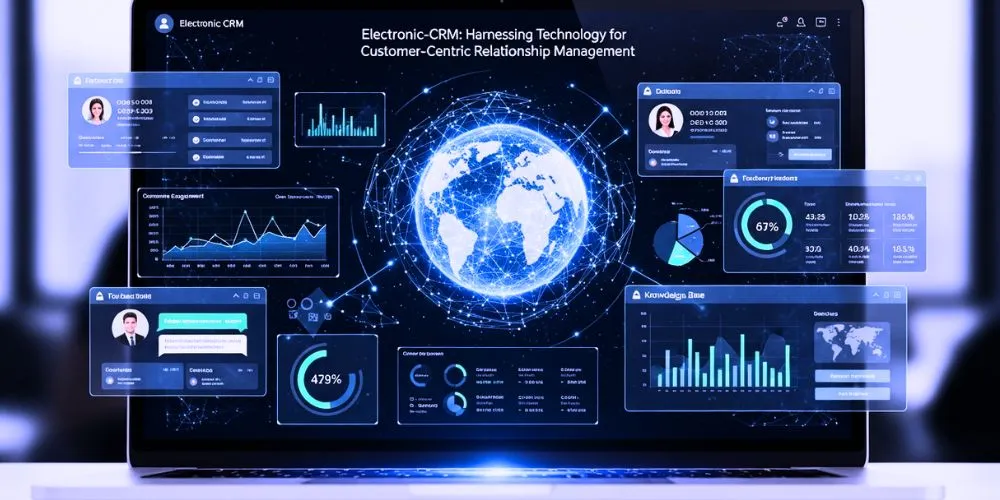In the modern business landscape, customer relationships are more critical than ever for driving success and growth. As the digital age shapes consumer behavior, companies must adapt to new methods of engaging with their customers. In this article, we will delve deeper into the significance of E-CRM, explore its key components, and understand how it empowers businesses to build strong and enduring relationships with their customers in the fast-paced digital landscape.
Understanding E-CRM
E-CRM, or Online CRM or Digital CRM, revolves around leveraging electronic platforms to manage and improve customer relationships. These platforms include websites, social media, email, and mobile applications. It enables businesses to connect with customers through multiple digital touchpoints, allowing for greater accessibility and engagement. Furthermore, it will enable companies to collect and analyze valuable customer data, leading to more effective customer interactions and targeted marketing efforts. Electronic Customer Relationship Management (E-CRM) is a strategic approach that leverages technology and online channels to foster lasting customer relationships. Unlike traditional CRM, it incorporates digital tools, data analytics, and personalized experiences to create seamless customer journeys and enhance customer interactions.
Critical Components of E-CRM
When implementing an effective E-CRM strategy, it’s essential to understand the critical components of this approach.
- Multichannel Customer Interaction: E-CRM enables businesses to interact with customers through various digital channels seamlessly. This integration allows customers to engage with a company through emails, social media messages, chatbots, and customer service portals, providing consistent and personalized experiences. Multichannel interaction fosters a sense of convenience and accessibility for customers, ultimately improving satisfaction and loyalty.
- Customer Data Analytics: Data analytics is a fundamental aspect of E-CRM. Businesses can gather valuable insights into customer behavior, preferences, and needs through various digital interactions. Data-driven analytics enable companies to understand their customers better, segment their target audience, and tailor products, services, and marketing campaigns accordingly.
- Personalization and Customer Segmentation: E-CRM facilitates customer segmentation based on demographics, behaviors, and purchase history. This segmentation allows businesses to deliver personalized marketing efforts, ensuring customers receive relevant, targeted content. Personalization enhances the customer experience and strengthens the emotional connection between the customer and the brand.
- Automated Marketing Campaigns: E-CRM streamlines marketing efforts by incorporating automated campaigns and personalized content. Automated emails, social media posts, and customized offers engage customers throughout their buying journey, leading to higher conversion rates and improved customer satisfaction.
- Customer Support and Service: It enhances customer support by offering self-service options and automated responses to common queries. This efficiency ensures that customers receive prompt assistance, leading to a positive customer experience and increased brand loyalty.
- Integration with Customer Touchpoints: E-CRM integrates with various customer touchpoints, including websites, mobile apps, and online marketplaces. This integration ensures consistent messaging and a unified customer experience, regardless of the platform used. A seamless experience across channels contributes to a positive brand perception and strengthens customer relationships.
The Impact of E-CRM on Customer Relationship Management
Implementing an effective E-CRM strategy can significantly impact customer relationship management by providing personalized communication, streamlined interactions, and continuous analysis of data to ensure successful and sustainable efforts.
- Enhanced Customer Engagement: E-CRM fosters active and meaningful customer engagement by providing personalized and relevant interactions. Customers feel valued and understood, leading to increased brand loyalty and advocacy. Businesses can build long-lasting relationships that drive repeat business and positive word-of-mouth by establishing an emotional connection with customers.
- Improved Customer Retention: With personalized experiences and efficient support, E-CRM enhances customer satisfaction and retention. Satisfied customers are likelier to remain loyal and continue doing business with the company. Building customer loyalty is especially crucial in the digital era, where customers have numerous options and can easily switch to competitors if their needs are not met.
- Data-Driven Decision-Making: It empowers businesses with valuable customer data and insights. Data-driven decision-making ensures that marketing efforts and business strategies align with customer preferences and trends. By leveraging data analytics, companies can optimize their offerings and tailor their approach to meet customer demands effectively.
- Increased Sales and Revenue: Personalized marketing campaigns and targeted offers lead to higher conversion rates and increased sales. E-CRM’s ability to reach customers on multiple digital platforms widens the customer reach and potential for growth. By tailoring marketing efforts to individual preferences, businesses can deliver compelling offers that resonate with customers and drive sales.
- Competitive Advantage: E-CRM provides a competitive advantage in the digital landscape. Companies that effectively leverage they can deliver superior customer experiences, stand out from competitors, and attract new customers. In a crowded marketplace, providing personalized interactions and seamless customer journeys can set a business apart and establish it as a leader in customer-centricity.
Conclusion
E-CRM is a transformative approach to customer relationship management, capitalizing on digital tools and data analytics to create meaningful and personalized interactions. In the age of technology, E-CRM enables businesses to build solid and lasting customer relationships, leading to increased customer satisfaction, loyalty, and revenue growth.
By integrating them into their business strategies, companies can stay ahead in the competitive digital landscape and secure their position as customer-centric leaders in their industries. As technology continues to evolve, embracing it will remain crucial for businesses seeking to harness the power of digital innovation to understand their customers better and deliver exceptional experiences that drive business success.













